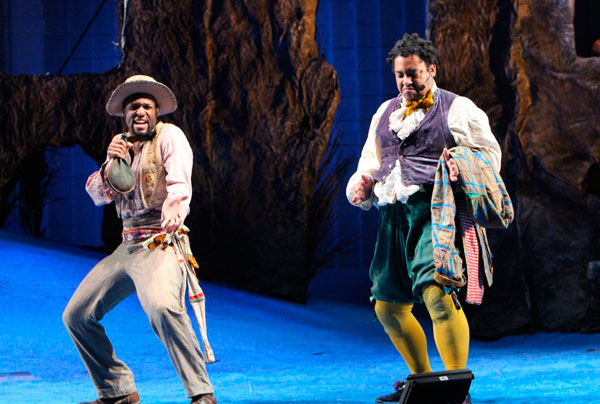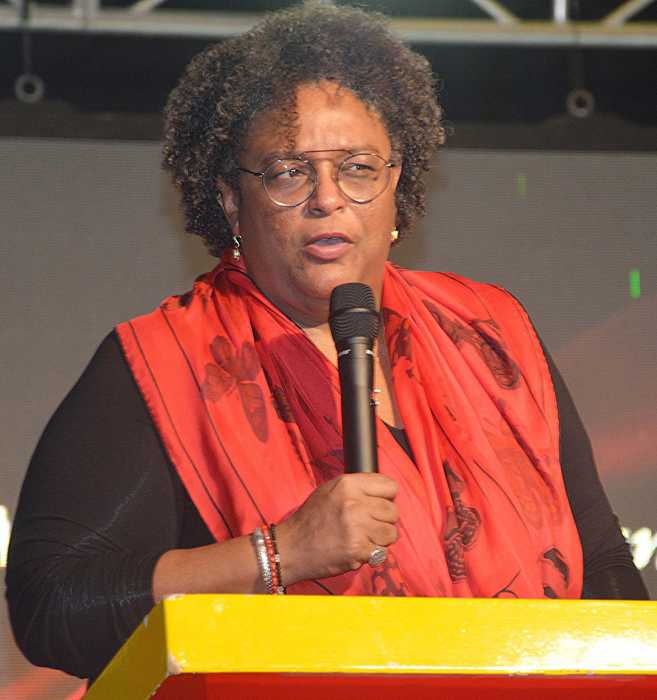What does the Caribbean and William Shakespeare have in common?
In many depictions of his famous plays, the characters are often depicted to be white and set in the many countries of Europe. The Classicall Theatre of Harlem, however, is taking Shakespeare’s “The Tempest” and infusing an Afro-Caribbean layer to create a universal story.
“There are ways that Shakespeare gets taught, gets seen that makes it exclusive, that makes it seem like it belongs to somebody else – you have to be rich and white and maybe British to get Shakespeare and that is not the case. Shakespeare wrote about genuine human beings in human situations and that is universal,” Anthony Vaughn Merchant, Jamaican and Puerto Rican descendant who plays Trinculo, explained.
Performed in Harlem’s outdoor Richard Rodgers Ampitheater in Marcus Garvey Park, the story comes to life with the sounds of pulsing drums, a violinist and the soothing singing voice of Haitian descendant Fedna Jacquet playing the spirit character Ariel.
Set in Hispaniola — home to Haiti and the Dominican Republic — Afro-Caribbean undertones shine through the use of dance, song, language and particularly the inclusion of spirtism, voodoo and thirst for freedom.
“The history of Haiti is nothing short of magical. This tiny Caribbean country won its independence by defeating three European superpowers: France, Britain and Spain, demonstrating the same fighting spirit found in Caliban, and the same longing for freedom as Ariel.” The Tempest” highlights the dynamics of freedom and captivity, imprisonment and rebellion, authority and tyranny,” Carl Cofield said in a press release.
“I think with Shakespeare you have a lot of different choices,” Jacquet said. “‘The Tempest’ takes place on an island, no one knows where, and then you have a prince and duke of Naples and those are the only givens. The fact that we decided on Haiti meant that it opened up a full box of possibilities so we can throw in some voodoo, we can throw in Creole and all of this other stuff that say if we set it in Hawaii you’d have a whole different box of possibilities.”
Veteran actor Ron Cephas Jones takes on the lead character of Prospero. Commanding the island with his charms and use of the spirits of the island, you are captured by the story’s use of music, aerial acrobatics, and call for “Liberte” or freedom.

“It is a story of someone being wronged and how that trickle down can happen unintentionally around them,” Merchant said. “He was wronged and as he was wronged and shipwrecked he enslaves these spirits and he realizes ‘wait a second, maybe this isn’t right’ and then that story of redemption and colonialism.”
Do not anticipate being lost in translation while watching “The Tempest.” The actors not only make it easy to understand the often-difficult text but there is also a well-balanced mix of modern day language infused. Expect to hear modern terms like “fleek” in this Shakespeare play.
Comedy, betrayal, revenge, redemption and young romance are all present during the hour and a half production. What is important to note about this rendition of “The Tempest” is that the story is truly brought to life in this setting with a flare of authenticity in its representation of people within the Diaspora and beyond.
“I think that it is crucial to the way that we do theater at the Classical Theatre of Harlem. We are all about being inclusive by telling the story through the lens of the African diaspora and through the lens of the people who live in Harlem and make up Harlem. It’s very important to us that we make it relevant,” Merchant said.
Presented by the Classical Theatre of Harlem and City Parks Foundation’s Summer Stage festival, the show is free to the public and runs until July 26.
“People should come because it’s a really cool production, it has blue sand and it is fantastic because you will see people who look like you spouting Shakespeare in a way that you will be able to understand it,” Jacquet said.
For show time information, visit www.cthny




























